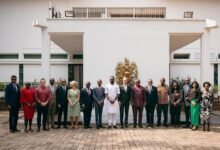Ghana Green Building Summit 2025 ends in Accra

The 6th Ghana Green Building Summit has been held in Accra, bringing together more than 300 stakeholders from government, development institutions, academia, the private sector, and civil society to deliberate on the critical role of sustainable buildings in shaping Ghana’s future.
Under the theme: ‘Reimagining Buildings and Cities for Economic and Social Prosperity,’ the Summit provided a robust platform for dialogue, innovation, and collaboration.
The overarching message was clear and emphatic: sustainable buildings are not a luxury reserved for the elite; they can and must be affordable.
Convened by Cyril Nii Ayitey Tetteh, the Summit reinforced the idea that sustainability is fundamentally about longevity, resilience, and inclusion.
“Sustainability is all about continuity. This happens when we embed sustainability into business, adopt processes with ESG frameworks and practise sustainable banking principles,” he noted in his welcome address.
Delivering the keynote speeches, the Minister for Works, Housing and Water Resources, Hon. Kenneth Gilbert Adjei, affirmed the government’s determination to make green building practices central to national development policies.
“We are actively integrating green building principles into our national housing strategies and programmes,” he stated.
Furthermore, Mr Adjei highlighted the District Housing Programme as a key initiative aimed at delivering sustainable, affordable homes in rural and peri-urban areas using environmentally responsible, locally sourced materials.
“Affordable in quotes because what is affordable to me may not be affordable to you,” he added, acknowledging the fluid definitions around affordability.
He also emphasised the need for green finance to unlock scale and accessibility.
The Minister of State for Climate Change and Sustainability, Mr Issifu Seidu, outlined Ghana’s broader climate response strategy.
In a speech read on his behalf by Cedric Dzelu – Technical Director to the Minister of State in charge of Climate Change and Sustainabilty, cited alarming World Bank projections that climate-induced economic losses could triple by 2050, with over 30 million Ghanaians potentially exposed to extreme heat.
“Climate change is not a distant threat. It is already impacting livelihoods, infrastructure, food security and the very sustainability of our cities,” he mentioned.
Paul Kwesi Ocran, Green Buildings Lead, Ghana, International Finance Corporation (IFC), delivered an in-depth presentation on the technical dimensions of green building in the country.
He underscored the affordability of sustainable design and stressed that green homes should not be limited to high-rise luxury developments.
“We should not always look at green buildings as three-storey buildings or the iconic ten-storey towers. Your home can also be green,” he said.
Citing examples from Accra and Tamale, Ocran detailed how low-tech design interventions—like reflective roofing and efficient lighting—have resulted in over 30 per cent energy and water savings in affordable housing projects.
Mr John Sheriff Bawah, Managing Director of State Housing Company Limited (SHCL), reinforced the need to redefine affordability in Ghana’s housing sector.
“It ranges from US$60,000 to US$250,000—everybody tags it affordable. That is the key issue,” he stated.
Bawah commended the summit for bridging technical expertise with youth innovation.
Ms Vera Owusu-Osei, Partner and Co-Chair of the Green Transition Practice at AB & David Africa, framed the summit as a model for how legal frameworks, investment strategies, and environmental priorities can intersect.
The Summit concluded with a broad coalition of partners now aligned to deliver affordable, inclusive, and sustainable cities—one green home at a time. The 6th Ghana Green Building Summit featured six panel discussions covering diverse aspects of sustainable building and development in Ghana.





